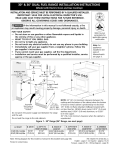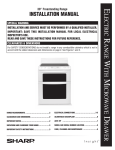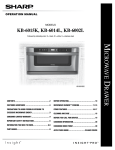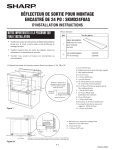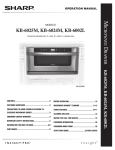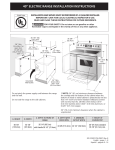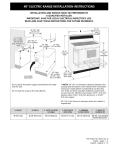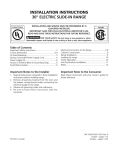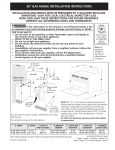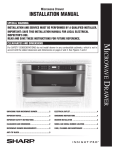Download Sharp KB-3425L Installation manual
Transcript
Installation Manual SPECIAL WARNING INSTALLATION AND SERVICE MUST BE PERFORMED BY A QUALIFIED INSTALLER. IMPORTANT: SAVE this installation manual FOR LOCAL ELECTRICAL INSPECTOR’S USE. READ AND SAVE THESE INSTRUCTIONS FOR FUTURE REFERENCE. Clearances & Dimensions For SAFETY CONSIDERATIONS do not install a range in any combustible cabinetry which is not in accord with the stated clearances and dimensions on page 2. See Figures 1 and 2. Range Measurements.......................................2 Electrical connections................................. 3-5 Clearances and Dimensions...............................2 Model and Serial number Location.....................4 Important Notes..............................................2 Anti-Tip ..................................................... 6-7 Unpacking and Examining your range..................3 Care, Cleaning and Maintenance .......................7 Important Safety Instructions..........................3 Notes.............................................................8 Electric Range With Microwave Drawer 30" Freestanding Range Installation Manual Range Measurements 30" minimum 30" to bottom of cabinet over cooktop 29 7/8" 18" to upper cabinets 44 3/8±1/8" backsplash 36 1/8" to cooktop surface 42" drawer open 6" 6 1/8" 6" 6 1/8" 27" back to front of doors 45 3/8" oven door open 36" countertop height Maximum depth of cord, 7 3/8" plug and receptacle box is 4" to prevent interference with lower oven. 30" door width Figure 1 4" preferred electrical outlet area 30" opening width Figure 2 To eliminate the risk of burns or fire by reaching over the cooktop, cabinet storage space located above the cooktop should be avoided. If cabinet storage is to be provided, the risk can be reduced by installing a range hood that projects horizontally a minimum of 5" beyond the bottom of the cabinets. Figure 1 contains many range measurements for reference when planning your kitchen and/or range location. Clearances and Dimensions • Provide adequate clearances between the range and adjacent combustible surfaces. Important notes to the installer • Dimensions that are shown in Figure 2 must be used. Given dimensions provide minimum clearance. There needs to be a 30-inch minimum clearance between the top of the cooking surface and the bottom of unprotected wood or metal cabinets or a 24-inch minimum when bottom of wood or metal cabinets are protected by not less than a 1/4-inch flame retardant millboard covered with not less than no. 29 msg sheet-steel, 0.015-inch stainless steel, 0.024-inch aluminum or 0.020-inch copper. Note that the gray shaded area on Figure 2 indicates the location for the electrical receptacle/connection. • Read all of the Installation Manual before installing the range. • Remove all packing material from the oven and drawer before connecting the electrical supply to the range. • Observe all governing codes and ordinances. • Be sure to leave these instructions with the consumer. Important notes to the consumer • Contact surface must be solid and level. Pay special attention to the floor. Be sure it is solid enough for the weight of the range. Check that the floor covering is smooth and flat and that it adheres to the sub-floor solidly. Keep this manual with your Operation Manual for future reference. • As when using any range generating heat, there are certain safety precautions you should follow. These are listed in the Operation Manual. Read all and follow carefully. • Check location where the range will be installed for proper electrical supply. • Be sure your range is installed and grounded properly by a qualified installer or service technician. Installation Manual • Before installing the range in an area covered with linoleum or any other synthetic floor covering, make sure the floor covering can withstand heat at least 90˚F (32.2˚C) above room temperature without shrinking, warping or discoloring. Do not install the range over carpeting unless you place an insulating pad or sheet of 1/4-inch (0.64cm) thick plywood between the range and carpeting. Unpacking and Examining your Range 1 Remove all packing materials from inside the Microwave Drawer and the oven cav it y. D O NO T R E M OV E T H E WAV E G U I D E COVER, which is located on the top of the Microwave Drawer area. Sealing Surface Waveguide Cover Never leave children alone or unattended in the area where an range is in use. As children grow, teach them the proper, safe use of all ranges. Never leave the oven door open when the range is unattended. Sealing Surface Stepping, leaning or sitting on the door or drawer of this range can result in serious injuries and can also cause damage to the range. Microwave 2 Remove the feature Drawer Cavity sticker, if there is one. Check the drawer for any damage, such as misaligned or bent drawer, damaged drawer seals and sealing surfaces, broken or loose drawer guides and dents inside the drawer or on the front side of the drawer. If there is any damage, do not operate the Microwave Drawer and contact your dealer or a SHARP AUTHORIZED SERVICER. • Do not store items of interest to children in the cabinets above the range. Children could be seriously burned climbing on the range to reach items. • To eliminate the need to reach over the cooktop, cabinet storage space above the cooktop should be avoided. • Do not use the oven as a storage space. This creates a potentially hazardous situation. Important Safety Instructions • Never use the range for warming or heating the room. If the information in this manual is not followed exactly, a fire or electrical shock may result causing property damage, personal injury or death. • Do not store or use gasoline or other flammable vapors and liquids near this or any other range. Explosions or fires could result. • Reset all controls to the “off” position after using a programmable timing operation. • All Ranges can tip • Injury to persons could result When using the Self-Clean Feature: • Install Anti-Tip bracket packed with Range • Remove broiler pan, food and other utensils before self-cleaning the oven. Wipe up excess spillage. Follow the precleaning instructions in the Operation Manual. • See Anti-Tip bracket Template for Installation Instructions Electrical Connections The installer or consumer is responsible for connecting the power supply cord to the connection block located behind the back panel access cover. To reduce the risk of tipping the range, it must be secured by properly installed Anti-Tip bracket packed with the range. This range may be connected by means of permanent “hard wiring” (flexible armored or nonmetallic shielded copper or aluminum cable), or by means of a power supply cord kit. Only a power supply cord kit rated at 240 volts or 208 volts and 50 amperes and marked for use with ranges shall be used. Cord must have either 3 or 4 conductors to match electric receptacle. The power cord kit is not included so must be purchase at an appliance store. • This range must be electrically grounded in accordance with local codes, or in their absence, with the National Electrical Code ANSI/NFPA No. 70—latest edition in United States. • The installation of ranges designed for manufactured (mobile) home installation must conform with Manufactured Home Construction and Safety Standard, title 24CFR, part 3280 [Formerly the Federal Standard for Mobile Home Construction and Safety, title 24, HUD (part 280)] or when such standard is not applicable, the Standard for Manufactured Home Installation 1982 (Manufactured Home Sites, Communities and Setups), ANSI Z225. 1/NFPA 501A- latest edition, or with local codes in United States. For mobile homes, new installations, recreational vehicles or areas where local codes do not permit grounding through neutral, a 4 conductor power supply cord kit rated at 240 volts or 208 volts minimum, 50 amperes and marked for use with ranges should be used. • Make sure the wall coverings and the cabinets around the range can withstand the heat generated by the range. Terminals on end of wires must be either closed loop or open-end spade lugs with upturned ends. Cord must have strain-relief clamp. The range connection opening should be 1 3/8-inches. Installation Manual 3 & 4-Wire electrical wall receptacle types & recommended mounting orientation on wall Risk of fire or electrical shock exists if an incorrect size range cord kit is used, or the installation instructions are not followed precisely and/or a strain relief clamp is not used. Figure 5A illustrates 4-wire receptacle required for new and remodeled installations. Do not loosen the nuts which secure the factory-installed range wiring to the terminal block while connecting range. Electrical failure or loss of electrical connection may occur. Figure 5B illustrates 3-wire receptacle that is allowed for existing installations. Electrical Shock Hazard • DISCONNECT POWER TO THE CIRCUIT BREAKER OR FUSE BOX BEFORE MAKING THE ELECTRICAL CONNECTION. • Electrical ground is required on this range. • Do not connect to the electrical supply until range is permanently grounded. • This range must be connected to a grounded, metallic, permanent electrical system or the grounding connector of the power cord should be connected to the grounding terminal or wire lead on the range. • Failure to heed these warnings could result in a fire, personal injury or electrical shock. 4-wire wall receptacle (14-50R) Figure 5A 3-wire wall receptacle (10-50R) Figure 5B Access to Terminal Block Loosen screw on rear access cover and pull down as illustrated in Figure 6 to access terminal block wiring connection. strain relief clamp screw Rating plate Figure 6 model and serial number location Power Cord Connections The rating plate, including model and serial number, is located on the faceplate behind the Microwave Drawer front. 4-Wire Connection instructions 208/240 Volt Connection Instructions Before wiring the range, review the suggested power source location drawing in Figure 2. If connecting to a 4-wire electrical system for a new branch-circuit or mobile home use a 4-wire connection. The range can be set for 208V or 240V. The voltage setting for your range is pre-set at 240V from the factory. Follow these steps to change the voltage setting. 1 Follow the power supply cord kit manufacturer’s Installation Instructions and install the strain relief clamp on the cord. See Figure 7. 1 Locate the voltage switch on the lower back side of the range. 2 Remove the screw and rotate the switch plate 180˚ as indicated in the Figure 3. 2 Connect the end connectors for line 1, line 2 and neutral and tighten securely to the terminal block. See Figure 8. 208V 240V 3 Reinsert the switch plate and replace screw as indicated in Figure 4. The voltage setting is indicated by the visible marking. 180˚ screw Figure 7 IMPORTANT DO NOT LOOSEN the factory installed nut connections which secure the range wiring to the terminal block. Electrical failure or loss of electrical connection may occur if these 3 nuts are loosened or removed. screw 3 You must disconnect the ground strap. Remove the factory installed ground screw and plate to release the copper ground strap from the frame of the range. Cut and discard the copper ground strap and plate. KEEP the ground screw. See Figure 8. Figure 3 4 Connect the green ground wire lead with the eyelet to the frame of the range with the ground screw using the same hole in the Figure 4 Installation Manual frame where the ground screw was originally installed. See Figure 8. 5 Make sure all screws are tightened securely and replace the rear access cover and secure with screw. See Figure 6. 3 & 4-WIRE PERMANENT WIRE CONNECTIONS 3-Wire Connection Instructions 1 Follow the manufacturer’s Installation Instructions for installing the strain relief clamp. 3–wire permanent connection – follow steps 1, 2 and 5 below. 4–wire permanent connection – follow all steps below. Before wiring the range, review the suggested power source location drawings in Figure 2. If connecting to a 4-wire electrical system: For existing installations ONLY, refer to Figure 9. 1 Follow the power supply cord kit manufacturer’s Installation Instructions and install the strain relief clamp. See Figure 7. 2 Connect the end connectors for line 1, line 2 and neutral and tighten securely to the terminal block. See Figure 9. IMPORTANT DO NOT LOOSEN the factory installed nut connections which secure the range wiring to the terminal block. Electrical failure or loss of electrical connection may occur if these 3 nuts are loosened or removed. 2 Strip insulation away from the ends of the permanent wiring for line 1, line 2 and neutral; also strip ground wire on 4-wire connections. Tighten all 3 or 4-wire leads to the terminal block. Follow wire locations shown in Figure 10. IMPORTANT DO NOT LOOSEN the factory installed nut connections which secure the range wiring to the terminal block. Electrical failure or loss of electrical connection may occur if these 3 nuts are loosened or removed. 3 A ground strap is installed on this range which connects the center terminal of the neutral terminal block to the range chassis. The ground strap is connected to the range by the center, lowest screw. See Figure 9. The ground strap must not be removed unless National, State or Local Codes do not permit use of a ground strap. NOTE: For 3-wire permanent connection skip steps 3 and 4 and continue with step 5. 3 Disconnect the ground strap. Remove the factory installed ground screw and plate to release the factory installed copper ground strap from frame of the range. Cut and discard the copper strap from the terminal block. KEEP the ground screw, ground plate and go to step 4. NOTE: If the ground strap is removed for any reason, a separate ground wire must be connected to the separate ground screw attached to the range chassis and to an adequate ground source. 4 Connect the green ground wire lead to the frame of the range using the ground screw and plate as shown in Figure 11. Be sure to install using the same hole in the frame where the ground screw was originally installed. 4 Make sure all connections are tightened securely and replace the rear access cover and secure with screw. See Figure 6. 5 Make sure all connections are tightened securely and replace the rear access cover and secure with screw. See Figure 6. 4-Wire Connection Connect line 1 here. Cut ground strap. Discard ground strap and ground plate. For 3 & 4-Wire Permanent Connections Terminal block ite ck gre en Figure 8 red wh la b Connect green insulated copper ground wire with ground screw here. NOTE: Non-terminated field wire compression connections must be set at approximately 90 in./lb. Note: Install strain relief clamp. Center or white wire must always be attached to the center terminal on block. Connect line 2 here. Connect neutral (white or center) here. A user supplied strain relief clamp must be installed at this location. It requires 1 3/8" (3.5 cm) diameter cord kit hole. terminal block line 2 line 1 terminal block neutral line 1 neutral ground strapground screw ground plate Figure 10 ground 3-Wire Connection 4-Wire Permanent Connection only screw ground plate Terminal block Connect line 1 here. Ground strap Note: Install strain relief clamp. Center must always be attached to the center terminal on block. Figure 9 ground strap line 2 ground plate Connect line 2 here. ground plate Connect neutral here. ground screw A user supplied strain relief clamp must be installed at this location. It requires 1 3/8" (3.5 cm) diameter cord kit hole. ground screw ground wire lead Figure 11 proper ground ground for 4-wire wire lead permanent proper ground for 4-wire permanent Installation Manual Mark the floor or wall where left or right side of the range will be located. If rear of range is against the wall or no further than 1 1/4 -inches from wall when installed, you may use the wall or floor mount method. See Figure 13. If molding is installed and does not allow the bracket to fit flush against the wall, remove molding or mount bracket to the floor. For wall mount, locate the bracket by placing the back edge of the template against the rear wall and the side edge of template on the mark made referencing the side of the range. Place bracket on top of template and mark location of the screw holes in wall. If rear of range is further than 1 1/4-inches from the wall when installed, attach bracket to the floor. See Figure 14. For floor mount, locate the bracket by placing back edge of the template where the rear of the range will be located. Mark the location of the screw holes, shown in template. Anti-Tip NORMAL INSTALLATION STEPS Anti-Tip bracket Installation Instructions Important Safety Warning To reduce the risk of tipping of the range, the range must be secured to the floor by properly installed Anti-Tip bracket and screws packed with the range. Failure to install the Anti-Tip bracket will allow the range to tip over if excessive weight is placed on an open door or if a child climbs upon it. Serious injury might result from spilled hot liquids or from the range itself. If range is ever moved to a different location, the Anti-Tip bracket must also be moved and installed with the range. Instructions are provided for installation in wood or cement fastened to either the floor or wall. When installed to the wall, make sure that screws completely penetrate dry wall and are secured in wood or metal. When fastening to the floor or wall, be sure that screws do not penetrate electrical wiring or plumbing. 2 Drill Pilot Holes and Fasten bracket Drill a 1/8-inch pilot hole where screws are to be located. If bracket is to be mounted to the wall, drill pilot hole at an approximate 20 degree downward angle. If bracket is to be mounted to masonry or ceramic floors, drill a 5/32-inch pilot hole 1 3/4-inches deep. The screws provided may be used in wood or concrete material. Use a 5/16 -inch nut-driver or flat head screwdriver to secure the bracket in place. 1 Locate the bracket - Using the Template The bracket may be located on either the left or right side of the range. Refer to figure 12b to locate the bracket if template is not available. FASTEN BRACKET (WALL OR FLOOR MOUNTING) leveling leg max 11/4" wall mount wall plate floor mount Anti-Tip bracket Figure 13 15" FASTEN BRACKET (FLOOR MOUNTING ONLY) 15" more than 11/4" leveling leg The edge of the template should be aligned with the left or right edge of the range. wall Figure 12A floor mount Figure 14 13 3/8" 13 3/8" 13 3/8" from the center of the wall opening to the edge of the backet. Figure 12B Anti-Tip bracket Installation Manual A minimum clearance of 1/8-inch is required between the bottom of the range and the leveling leg to allow room for the bracket. Use a level to check your adjustments. Plug range into properly prepared electrical receptacle or if hard wired, check that it was completed properly. Check floor condition for evenness and stability. Slide range back into position. See Figure 18. 3 Level and Position Range NOTE: • Measure from the countertop to the floor height to determine the height that the back of the range needs to be set at. • Loosen legs and lock nuts to set level of the range. (Note that the lock nuts are only on the rear feet). See Figure 15. Visually check that rear leveling leg is inserted into and fully secured by the Anti-Tip bracket by looking underneath the range with a flashlight and carefully attempt to tilt it forward. Figure 15 Range Leg Lock Nut (Rear leg only) • Adjust the back leveling legs with an adjustable wrench or pliers. Measure from the floor to the top of the cooktop glass (X) and adjust the legs to match the measurement (Y) taken from the cutout. See Figure 16. 1 5/8" to edge of bracket Range Slide (Y") floor to top of countertop Figure 18 (X") floor to top of cooktop glass Figure 16 • After leveling, tighten the lock nuts on the rear to prevent the feet from turning when sliding into position. See Figure 17. Figure 17 Installation Manual Care, Cleaning and Maintenance Refer to the Operation Manual for cleaning instructions. If removing the range is necessary for cleaning or maintenance, disconnect the electrical power supply. If the electrical supply is inaccessible, lift the unit slightly at the front and pull out away from the wall. Pull only as far as necessary to disconnect the electrical supply. Finish removing the unit for servicing and cleaning. Reinstall in reverse order making sure to level the range and check electrical connections. See pages 2 and 3 for proper anchoring instructions. Before You Call for Service Read the BEFORE YOU CALL and operating instruction sections in your Operation Manual. It may save you time and expense. The list includes common occurrences that are not the result of defective workmanship or materials in this range. Refer to your Operation Manual for our service address. Sharp's toll-free telephone number is 1-800-BE-SHARP (1-800-237-4277). Please call or write if you have inquiries about your range product and/or need to order parts. NOTE: Please do not open or close the lower oven door for 30 seconds after plugged in. SHARP ELECTRONICS CORPORATION Sharp Plaza, Mahwah, New Jersey 07430-2135 Printed in USA TINSEB 4 3 8 MRR1








